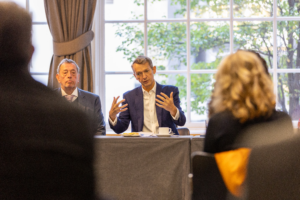Free online course from Royal Holloway and UK Parliament marks 100 years of votes for women
Royal Holloway, University of London, in partnership with the UK Parliament, is launching the course Beyond the Ballot: Women’s Rights and Suffrage from 1866 to Today. This free online MOOC (Massive Open Online Course), delivered by FutureLearn, the social learning platform, explores the campaign for votes for women and its impact on women’s rights and equality to the present day.
The launch of the course coincides with the 100 year anniversary of the enactment of the Representation of the People Act 1918 which, for the first time, gave some women and most men the right to vote. Beyond the Ballot starts on 5 February 2018. It is supported by the Heritage Lottery Fund and Parliament’s Vote 100 Project, a year-long programme of events celebrating a century of women’s voices in Parliament.
The course takes learners on a journey back to the nineteenth century to explore the legal, social and economic frameworks that limited women’s rights prior to the vote. It also introduces learners to some of the pioneering women who campaigned for change. Through rich content including interviews with historians and experts from Royal Holloway and the UK Parliament, learners will develop their understanding of how and why the vote was extended to women in 1918. They will explore the movements seeking to create change and discuss how the struggle for equality continued throughout the twentieth century. Highlights include access to rarely seen documents from The National Archives and the Parliamentary Archives, as well as interviews with female MPs reflecting on some of the remaining barriers to equality.
Matthew Smith, Senior Fellow in Public History at Royal Holloway, University of London, said: “Beyond the Ballot looks to challenge many of the myths and preconceptions that surround women’s lives in the nineteenth century, and to put the campaign for the vote into its wider social and political context. We will also explore the crucial question of what happened after votes for women had been achieved. We want to encourage as many people as possible to register for this free course as it’s important to understand why women wanted the vote in the 1800s, how they campaigned to achieve their goal and what impact the vote has made to this day.”
Mari Takayanagi, Senior Archivist in the Parliamentary Archives, said: “Here in Parliament we’ve been working towards 2018 celebrations for some time with our Vote 100 Project, and Beyond the Ballot is a really important part of this. It’s a great way of sharing many amazing and little-known stories of women in public life and politics over the last 200 years, with as wide an audience as possible. So many issues are still relevant today, and we hope people from all over the world will sign up, complete the course, and participate in the discussion.”
Nigel Smith, Head of Content at FutureLearn, said: “This is an incredibly important part of UK history, a very relevant topic today, and an exciting project to be part of. In particular, I’m delighted that we’re able to provide a platform to enable a huge volume of people from across the globe to get access to and learn from the materials from the National and Parliamentary Archives, as well as hear about the women who influenced politics over the last two centuries. I’m always proud of our vision at FutureLearn: to build a global community where everyone learns together and enjoys access to the education they need to transform their lives; this course certainly embodies that vision.”
Royal Holloway, University of London, was founded in 1886 as a pioneering women’s college in the formative early years of the women’s suffrage movement, just over ten years before the formation of the National Union of Women’s Suffrage Societies. Royal Holloway is marking the centenary of the right to vote and celebrating its progressive history and commitment to diversity and equality with a year-long celebration of suffrage, called Vote 100 at Royal Holloway. The university’s calendar of events in 2018 will bring to life the legacy of suffrage and the development of democracy. Highlights include a Women’s Suffrage exhibition in the university’s new Emily Wilding Davison Building and an international conference on women at university to specially commissioned works of music and theatre.
-Ends-
About Royal Holloway, University of London – royalholloway.ac.uk
Royal Holloway, University of London, is ranked in the top 30 universities in the UK[1] and the top 200 universities in the world[2]. Through world class research that expands minds and changes lives, the dedication of our teachers and the feel of the Royal Holloway experience, ours is a community that inspires individuals to succeed academically, socially and personally.
The university was founded by two social reformers who pioneered the ideal of education and knowledge for all who could benefit. Their vision lives on today. As one of the UK’s leading research-intensive universities we are home to some of the world’s foremost authorities in the sciences, arts, business, economics and law. We are strengthened by diversity, and welcome students and academics who travel from all over the world to study and work here, ensuring an international and multi-cultural perspective within a close knit and historic campus.
About UK Parliament – parliament.uk
The UK Parliament is the supreme legislative body in the United Kingdom. It is made up of three parts: the House of Commons, the House of Lords and the Sovereign. The main functions of the UK Parliament are to check and challenge the work of the Government, to make and change laws, to debate the important issues of the day, and to check and approve Government spending.
The main business of the UK Parliament takes place in the two Houses. The House of Commons is the democratically elected chamber of the UK Parliament. The UK public elects 650 Members of Parliament (MPs) to represent their interests in the House of Commons. MPs consider and can propose new laws, raise concerns on behalf of their constituents, question government ministers, contribute to debates, participate in Committees and vote on new laws. The House of Lords is the second chamber of the UK Parliament. It is independent from, and complements the work of, the House of Commons. The House of Lords shares the task of making and shaping laws and checking and challenging the work of the Government. The majority of Members of the House of Lords are life peers appointed to contribute theirexperience and knowledge from a wide range of occupations to the work of Parliament.
About Vote 100
UK Parliament’s Vote 100 project is a year-long programme of events celebrating a century of women’s voices in Parliament, the journey towards universal suffrage and the first women MPs. Throughout 2018, Vote 100 will celebrate these milestones, and the contribution of women to politics in the UK, with a series of events, exhibitions and educational programmes. For further information on Vote 100www.parliament.uk/vote100
About FutureLearn
Founded by The Open University in 2012, FutureLearn is a leading social learning platform, enabling online learning through conversation. With over 7 million people from over 200 countries across the globe – a community that is continuously growing – it offers free and paid for online courses from world-leading UK and international universities, as well as organisations such as the European Space Agency, the British Council and Cancer Research UK. FutureLearn’s course portfolio covers a wealth of areas to promote lifelong learning for a range of applications including general interest, an introduction to university studies, continuing professional development and fully online postgraduate degrees.
[1] Times and Sunday Times Good University Guide 2018
[2] Times Higher Education World University Rankings 2018


